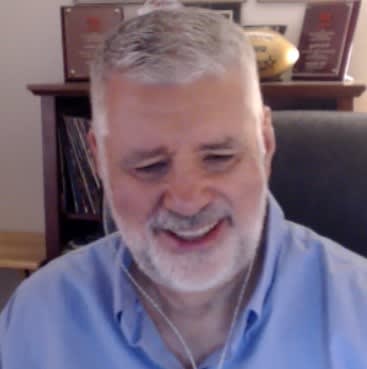Editor’s note: This is the second story in a multi-part series profiling new Notre Dame athletic director Pete Bevacqua, who officially succeeded Jack Swarbrick on March 25.
Part I: New AD Pete Bevacqua shares his vision for Notre Dame's next national title

SOUTH BEND, Ind. — Pete Bevacqua was every bit as aghast as the Notre Dame athletic director at the time, Kevin White, about the proliferation of people wearing bright red pants and corncob hats to an Irish home football game in September of 2000.
Bevacqua, the current ND athletic director for the better part of two weeks now, though, was just an angry alum at the time. And his mood was only slightly mitigated by the scare the Irish threw into a No. 1-ranked and visiting Nebraska team before succumbing 27-24 in overtime.
The disappointment over the Sea of Red persisted, though, long after the Cornhusker fans turned an allotment of 4,000 seats into a 30,000-strong showing in what was then an 80,323-seat Notre Dame Stadium.
Seventeen years later to the day, Sea of Red II unfolded when Georgia made its first-ever trip for a game at now 77,622-seat Notre Dame Stadium. The Bulldogs allotment was slightly larger than Nebraska’s — 8,400 — but far smaller than the estimated 30,000 who made up almost 40% of the crowd and seemingly more than 50% of the noise decibels.
Related Content
► Chat Transcript: Talking Notre Dame football with Eric Hansen
► New AD Pete Bevacqua shares his vision for Notre Dame's next national title
► RB Aneyas Williams is already an 'ascending player' for Notre Dame football
► Notre Dame football CB Christian Gray working on dominant mindset
► Notre Dame football depth chart projection after spring practice No. 6
Then came Ohio State last Sept. 23, with the same dominant color, but a much more muted showing from such a rabid fan base. Yes, the Buckeye crowd exceeded its allotment, but nowhere near in proportion to Nebraska or Georgia. And the ones who did make it in via the secondary ticket market were scattered in puddles rather than a sea of them.
That was by design, and it’s part of Bevacqua’s job — as he sees it — moving forward, having been in his eight-month job-shadow of Jack Swarbrick at the time of the OSU game before officially succeeding Swarbrick on March 25.
“We owe it to our fans. We owe it to Notre Dame to make sure we’re out in front of that,” Bevacqua said of tamping down visiting fans’ presence to a manageable level at Irish home games. “And I think you’ve seen those results. They're demonstrable,”
But the nuances apparently are not for public consumption.
“It would be like sharing the secret formula for Coca-Cola,” Bevacqua told Inside ND Sports in a one-on-one interview earlier this week. “So, I won’t go into too much detail, but to Notre Dame’s credit and the really smart people we have working in our ticket office here in our athletic department, it’s best practices around the country. It’s what works.
“The whole art of ticket sales has absolutely matured over the course of the last several years, aided by technology and moving away from paper tickets to tickets on your phone. It allows you to have your hands far more on the steering wheel than you could back in the day of that Nebraska game or even, quite frankly, as recently as the Georgia game.”
After the Nebraska game in 2000, White revealed that a surveillance camera mounted high atop Notre Dame Stadium had the technological capability to identify just which N.D. ticket-holders allowed their seats to be occupied by the visiting fans.
"We're not contemplating revoking ticket privileges," White said at the time."We think revoking privileges is unrealistic at this point. However, we were extremely disappointed. Our hope is that this was a one-time thing.”
Now Bevacqua and his incarnation of the ND athletic department can do much more than hope.
“The whole landscape, the whole strategy, the whole technology and the intelligence behind initial ticket sales, secondary ticket sales and tertiary ticket sales have become so much more advanced,” Bevacqua said.
As seriously as Bevacqua takes making sure the product on the field is evolving toward Notre Dame as a national title contender — and eventually, the capturer — digging into the details of things like enhancing the stadium experience, strategic scheduling, and monitoring whether the ACC will hold together through lawsuits and realignment are aspects he sees as part of his everyday charge.
Now and moving forward.
And as soon as this December, perhaps, comes another challenge in the potential of Notre Dame hosting a College Football Playoff game in a first-ever 12-team field. By rule, for at least the next two postseasons, the Irish will stage a first-round game at Notre Dame Stadium if they finish anywhere in the top eight of the final CFP rankings.
Because Notre Dame can’t win a conference title, it can’t earn a first-round bye or a 1 through 4 seed.
“Any of the teams that are hosting a playoff game next year, it’s a brand new world,” Bevacqua said. “But we are very confident that if a Notre Dame football game in the first-ever playoff game here on campus against obviously an unbelievable opponent, that’s compelling. That’s a high-class problem.”
Meaning that he isn’t sweating trying to sell out the stadium in likely frigid weather in a small window. Nor is he the fact that those first-round dates in 2024 (Dec. 20-21) and ‘25 (Dec. 19-20) butt up against ND’s published final exams week, meaning game prep would conceivably take place during exams.
Nor does Bevacqua have angst about visiting fans possibly taking over the stadium, red-clad or otherwise.
“We’ve talked about how we’ve gotten so much smarter in terms of making sure that when you enter into Notre Dame Stadium — regardless of who they’re playing — you know you’re in Notre Dame Stadium,” he said. “And you get to see a lot of blue and gold and green. That’s our key. But this playoff home game is going to be different. This is going to be new for everybody.”
The exam schedule isn’t just about the players, either. It’s about keeping dorms open and dining halls running for a couple of extra days to accommodate ND students, so they can be a part of that home crowd.
The first-round game could be scheduled on a Friday night or during one of three time slots Saturday afternoon/evening.
“Our students are going to come off a long, hard week of exams, as are our student-athletes, " Bevacqua said. “And what a great celebration that could be on that Friday night or that Saturday. We definitely want our students here. That’s part of the Notre Dame experience.”
The exam schedule for the players requires more study, as do some of the other aspects of potentially hosting a playoff game. And Bevacqua and his staff are already walking down that road.
“One thing about Notre Dame — academics always come first,” he said. “First, we have to make [the playoff], and we’ll do everything we can to make it. But working with the university to adjust the campus schedule, really for the benefit of our students to make sure that we can successfully host a game, and the impact that will have on exams and the impact that will have on on-campus residency, we have a working group put together to work through all those issues.
“So, we won’t be surprised by anything.”
And in 2026, the playoff calculus may change again — with a 14-team format the more likely outcome than staying at 12 beyond the first two years. And if the 14-team format is adopted, the Irish will be guaranteed a spot if they finish 14th or higher in the final CFP standings, regardless of automatic qualifiers not in the top 14 potentially bumping at-large teams.
“Over the course of the next eight years [the length of the CFP contracts], the strength of schedule for programs around the country is going to be of an all-time importance in terms of making your way into the CFP,” Bevacqua said.
“We know that, and other major programs know that. And the thing is Notre Dame has never shied away from playing an incredibly competitive schedule. That’s a key for us going forward.”
Bevacqua’s go-to person for that is former Irish quarterback and current deputy athletic director for football Ron Powlus.
“We happen to have a football-scheduling savant in our midst,” Bevacqua said. “So, I can’t tell you how comforted I am by Ron’s breadth of knowledge. He and I have countless conversations about scheduling and the importance of scheduling.
“And the good news for us is that the majority of our games, if you look out through 2032 — we have some holes in the schedule — but we have a great foundation of what our schedule is going to look like over the course of the next decade. And we also have the flexibility to add compelling matchups both here and away.”
Along scheduling lines, a couple of front-burner issues come to mind: the future of the USC and Stanford series, and the future of the Shamrock Series.
• USC heading to the Big Ten next season helped precipitate the implosion of the Pac-12. Stanford’s escape cross country to the ACC was a byproduct of that. And since 1998, with some rare alterations, the Irish have played one of them at home in October and the other one in the regular-season finale after Thanksgiving on the road, alternating sites each year.
The exceptions: In 2001, a game against Purdue got tacked on at the end of the regular season in December after its Sept. 11 original date was postponed due to the 911 tragedies. In 2003 Notre Dame played a December road game at Syracuse a week after the California trip. And in 2020, the whole thing got blown up by the COVID-19 pandemic, with the Irish joining the ACC as a full-time member for a year.
“What I will say about both of those series — the Notre Dame-Southern Cal game is one of the great matchups in the history of sports,” Bevacqua said. “It’s fundamentally important to us that we continue that rivalry, and we know that USC feels the same way.
“We also want to continue the Stanford rivalry. It’s had a great history of its own, and universities like Notre Dame and Stanford, we need to play each other. It's great to play each other. It’s important to play each other. Two top-ranked academic universities that also happen to put a real emphasis on athletics.
“Again, the exact times and locations and when that will happen, that could vary over the course of the next decade, but we start with the principle that we absolutely want to continue to play Southern Cal every year. We want to continue to play Stanford every year. And we don’t think they agree — we know they agree.”
• Meanwhile, the Shamrock Series — the concept, not the name — was the brainchild of Kevin White. Jack Swarbrick’s predecessor as Notre Dame’s athletic director. It started in 2009 in San Antonio “as the offsite home game” with a matchup against Washington State in a game White scheduled and Swarbrick presided over.
Swarbrick soon added the name Shamrock Series and tweaked the concept and made it an almost annual event. Breaks have been taken in 2017 for the first year in the Campus Crossroads Stadium renovation, an intended break in 2019 and an unintended one in 2020 because of COVID-19.
The Irish, who play Army at Yankee Stadium on Nov. 23 in New York this coming season, are 12-0 all-time in Shamrock Series games.
“I would say I absolutely love it,” Bevacqua said of the Shamrock Series concept. “We absolutely plan on continuing it. We think it’s so important to take Notre Dame, the most national/international of college football brands, and bring it to great places around the country and the world, quite frankly.
“You think about where we’re going next year to play that game, Yankee Stadium — 100th anniversary of the Four Horsemen Game, against Army. It’s going to be a primetime game on NBC. It’s going to be a blast. But I don’t think it needs to be every year.
“I don’t think there’s any magic in terms of how often we play it, but we’re definitely going to continue to do it. When you think back to the Knute Rockne days, you take Notre Dame on the road, you go out to LA and play Southern Cal. It’s kind of one of the many things that put Notre Dame football on the map.
“And to take the history and the tradition and the power of Notre Dame football and to go to different great venues around the country and around the world. So whether that’s Yankee Stadium, Dublin, Ireland, Lambeau Field, we are going to continue to do that. That’s important to us. Will we do it every year? Probably not.”
• Then there’s Notre Dame’s commitment to playing, on average, five ACC schools a year in football as the price of having the league house its basketball teams and most of its Olympic Sports.
Tha agreement runs through 2036, but given recent legal action by first Florida State, then Clemson, will the ACC be as viable or even be around that long?
“I am on all of those calls with commissioner Jim Phillips and all the other ADs in that conference,” Bevacqua said, “obviously working through scheduling now with the addition of Stanford, Cal and SMU. That ACC’s been really thoughtful there.
“Of course, there’s no denying that everybody is looking at, thinking about, keeping an eye on the FSU and Clemson lawsuits, seeing how those will turn out. Obviously, we were not directly involved in that, but we’re observing it.
“There are so many strengths of the ACC. Obviously, we have to see how these lawsuits play out. I think that the ACC having a guaranteed seat at the table and a confirmed spot in the College Football Playoffs is a great thing.
“And so, there’s a lot of movement, a lot of conference realignment. From conversations I’ve had with the commissioners of the four major conferences, I think those four commissioners are hopeful and want to just see some stabilization, and everybody take a deep breath and see who things play out.”
Coming Sunday, Part III: What matters most to Bevacqua now and spinning forward into an uncertain future of college athletics. Also, the importance of following Jack Swarbrick's lead in maintaining and enhancing Notre Dame's seat at the table when it comes to the national landscape.

---------------------------------------------------------------
• Talk with Notre Dame fans on The Insider Lounge.
• Subscribe to the Inside ND Sports podcast on Apple Podcasts, Spotify, Google Podcasts, SoundCloud, Podbean or Pocket Casts.
• Subscribe to the Inside ND Sports channel on YouTube.
• Follow us on Twitter: @insideNDsports, @EHansenND, @TJamesND and @cbowles01.
• Like us on Facebook: Inside ND Sports
• Follow us on Instagram: @insideNDsports
